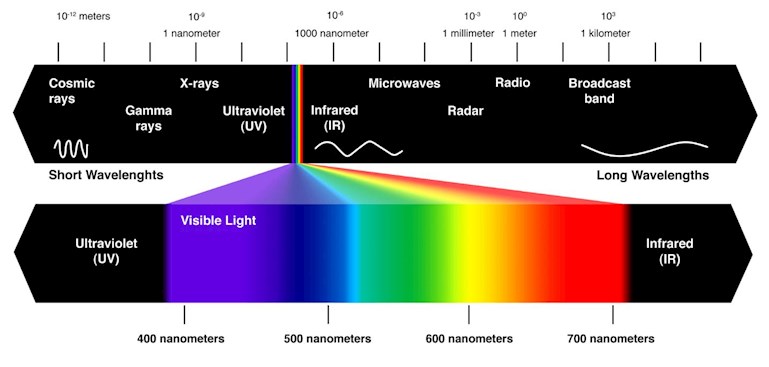Following my recent MCTD/Lupus diagnosis I've been on a quest to understand photosensitivity and photophobia (two separate medical conditions and not the same as is often suggested) and what I could do practically around my home to alleviate my symptoms, particularly in choosing light bulbs.
I've decided to share some of my findings and helpful links here as new people like me are joining the group all the time.
My journey started with the realisation that I didn't understand the very thing that has given me pain and discomfort for years and the thing we all take for granted .... light.
First, please remember:
1. This is not designed to be an exhaustive description of light but
rather a basic, layman's overview and how it pertains to lupus.
2. I am not an expert in any way and you must always do your own research before making health related decisions.
Here's the sciencey stuff:
Light is part of the electromagnetic spectrum (see above image). The different kinds of radiation that make up this spectrum have specific wavelengths and are measured in nanometres (nm). This is the measurement you may see on the packaging of some types of bulbs, particularly UV bulbs. One nanometre (nm) is equal to one billionth of a metre. That's pretty darn small and yet depending on the measurement and on whether they are shorter or longer wavelengths these can be safe or harmful to the human body.
Generally speaking, shorter wavelengths are more harmful, ie. Ultraviolet light, X-rays, etc. Beyond that, different people are affected by different wavelengths and harmful exposure times vary from person to person. This affect is heightened within the lupus community due to photosensitivity.
The 3 types of light radiation relevant to lupus are:
1. Ultraviolet (10-400 nm)
2. Visible Light (380-750nm)
3. Infrared (700nm-1mm)
Visible light (the range that can be perceived by a typical human eye) is made up of the colour spectrum. Each colour has it's own narrow band on the spectrum from violet (380-450nm) through to red (625-700nm). Blue, often the colour of concern to lupus sufferers, sits in the 450-485nm band.
Notably, there is no designated "wavelength" for the colour white as natural white light (daylight) is comprised of all the other colours in the spectrum. This is well illustrated when natural daylight is turned into a rainbow on a rainy day.
Visible light (natural daylight) is remarkable in the sense that we don’t discern the individual colours and yet they certainly exist and play a significant role in what happens within our bodies and how we feel. This is well borne out when lupus sufferers relate how different coloured lightbulbs affect their symptoms beneficially or adversely.
End of sciencey stuff.
Bulb Shopping Tips:
LED bulbs are the standard these days for domestic use as they are much more energy efficient. Generally, the lower the colour temperature (measured in Kelvin) the warmer and less blue it will be.
2700k (Warm White) appears to be the benchmark for Lupus sufferers although clearly everyone is different. There are some 'vintage' style LED bulbs which have an even warmer colour temp of 2200k and lower.
I personally decided to opt for a smart bulb as I needed something that was highly adjustable and tunable in terms of colour temp and brightness. Smart bulbs require wifi or bluetooth and are operated by a smartphone app. They are a bit fiddly to set up but so far so good. I also found one that goes as low as 2200k so was very pleased. I'm able to have one colour temp and brightness through the day and another for night-time which has already proved beneficial to me.
These articles/links were particularly helpful:
lupusuk.org.uk/eclipse/a-gu...
